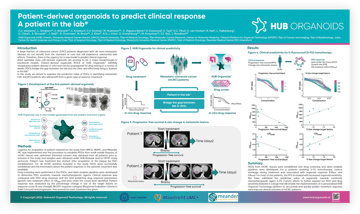Patient-derived organoids predict clinical response: a patient in the lab

Colorectal cancer (CRC) is the third leading cause of cancer and cancer-related death. A large fraction of the CRC patients diagnosed with de novo metastatic disease (mCRC) do not benefit from current standard of care and still experience substantial side effects. Therefore, there is an urgent need for advanced preclinical models to predict clinical response.
Adult epithelial stem cell (ASC)-derived organoids are proving to be a major breakthrough in preclinical modelling of human disease. ASC-derived organoids can be developed from healthy as well as diseased tissue, including cancer lesions and therefore are often referred to as patient-derived organoids (PDOs or HUB Organoids®). These models are established directly from patient tissue, represent the tissue of origin, faithfully recapitulate patient disease in vitro, and can be propagated for drug testing in a matter of weeks. PDOs bridge the gap between the lab and the clinic and effectively bring a “patient in the lab”.
Download this poster to discover:
- The establishment and characterization of a biobank of mCRC organoids
- Validation data on the predictive value of PDOs in the stratification of metastatic CRC (mCRC) patient
- Current efforts on the establishment of a platform for personalized medicine based on HUB Organoid Technology
